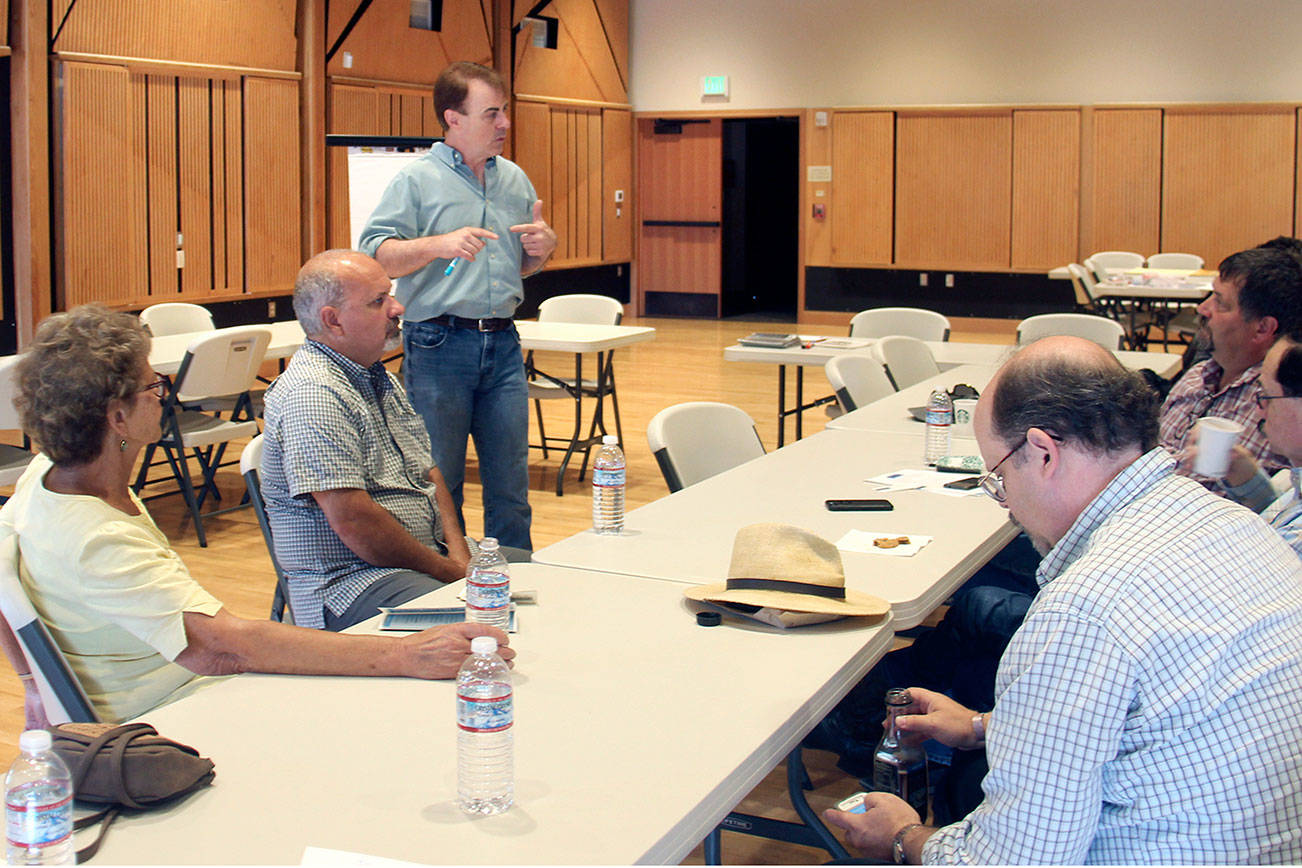By Christi Baron
Olympic Peninsula News Group
FORKS — Rural America is getting left behind, Bob Schroeter, executive director of the Clallam County Economic Development Corp., told a group that gathered for a town hall meeting last week.
“We need to diversify here in Clallam County,” Schroeter said, comparing what is happening in parts of Clallam County to job losses in coal country.
The EDC hosted a town hall meeting in Forks on Thursday. Similar town hall meetings, also from 4 p.m. to 6:30 p.m., are set today in Sequim at the Sequim Transit Center, 190 W. Cedar St., and Thursday in Port Angeles in the Clallam County commissioners’ meeting room (160) at the county courthouse, 223 E. Fourth St.
The Forks town hall drew a small group of interested residents, representing the Forks Chamber of Commerce, West End Business and Professional Association, the city of Forks, current and former county commissioners, a Port of Port Angeles commissioner, a candidate for mayor and several residents relatively new to the West End.
Schroeter praised the county’s current three commissioners, saying while they might have differing viewpoints, they get along in public and work together and that is how the economy gets going: by working together.
“I am looking for ideas. What are economic ideas for not just Forks but all of Clallam County?” Schroeter asked.
The group was asked to describe what makes Forks special in one word.
Some of the responses included: hearty, adaptive, helpful, pioneers, protective, remote, timber and Twilight, the latter referring to Stephenie Meyer’s best-selling novels set in Forks.
Forks City Councilwoman Juanita Weissenfels described Forks as sometimes messy … as in the pot is always stirring.
In a town with roots in the timber industry, arrearage and the closure of mills was a topic of conversation.
The last lumber mill on the West End, Allen Logging, closed in 2015. General Manager Gerry Lane cited an unreliable supply of logs from state and private land as the primary reason.
Arrearage — the volume of timber that the state Department of Natural Resources (DNR) promised to sell but failed to sell in the 2005-14 planning decade — has been blamed in part for the closure of Clallam County mills.
“We need the Department of Natural Resources to meet their harvest levels,” said Forks attorney-planner Rod Fleck.
Schroeter said he felt the new commissioner of public lands, Hilary Franz, was opening a dialogue in that direction with her recent tour around the state.
Schroeter said many manufacturing jobs are just never coming back due to mechanization.
Some of the ideas offered by the group for future jobs in the area included remote work via computer, advanced wood products, tourism and arts.
Resident Ronnie Aldrich bought a home in Forks two years ago and now operates an Airbnb inside the Forks city limits.
Aldrich said what he sees missing is recreational businesses that could piggyback off the people heading to Olympic National Park.
“But maybe people here don’t want that type of business coming in?” he asked.
The group discussed the issue of having only one plumber, one electrician and one lawyer.
Tim Fletcher, a candidate for Forks mayor in the Nov. 7 general election, said, “When timber went away, we lost a lot.”
Also needed are more nurses, school teachers and adult assisted living facilities.
Lissy Andros, executive director of the Forks Chamber of Commerce, said she has many business ideas related to tourism such as bicycle and ATV rentals, especially once the Olympic Discovery Trail has a presence in the West End.
The need for another taxi service was mentioned as well as some sort of lodging south of Forks. It was also discussed that in the summer, lodging is insufficient.
The conversation got around to the marijuana industry and what economic impact it could have on the area.
Ed Losby, who has lived in the Forks area for about two years, felt there could be more growing operations and retail businesses and questioned why the large building at the Forks Industrial Park, the former Interfor Mill site, could not be used for this.
Fleck explained that the building, owned by the city, was built with federal funding and that that particular industry is prohibited.
Fleck also brought up the fact that the city water and sewer systems need updating that will cost millions.
After the meeting, Fleck said, “It was a good discussion that reiterated the need to pursue manufacturing jobs in wood products while also thinking about how to grow the tourism sector.
“Bob and his team have reinitiated the outreach that was a missing component these past few years.”
Said Schroeter: “It was a great start and not a bad showing for a summer day.
“We received some really great feedback.
“We’ll put together the ideas shared and come back to the City Council and chamber in September to share next steps together.”
________
Christi Baron is the editor of the Forks Forum, which is part of the Olympic Peninsula News Group, composed of Sound Publishing newspapers Peninsula Daily News, Sequim Gazette and Forks Forum. Reach her at cbaron@forksforum.com.

